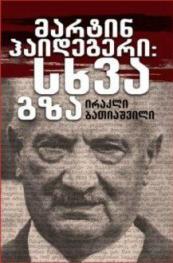MARTIN HEIDEGGER: A DIFFERENT PATH
BATIASHVILI IRAKLI
This work by Irakli Batiashvili is an unusual book: on the one hand, it is an academic commentary on the central themes of Heidegger’s Being and Time, yet, on the other hand, it follows the author’s ‘stream of consciousness’, which is an apparently unending combination of his thoughts, associations, inner experiences or feelings. But if the book is read slowly, the reader will intuit that the work’s structure or composition is a striking illustration (in the best sense of the word) of Heidegger’s views. An artistic and documentary background is elegantly filled in to the arguments: the human elements of pain and sorrow are condensed around one personality, only to spread out again and be generalised, so that we can perceive in its multiplicity the whole, as a multitude in one thing. Beginning with Freudian theory, taking up modern political developments and, ending with terrorism itself, offers us a countless number of themes in the field of thought raised during a reading of Being and Time. First of all, he elegantly devotes to this original compositional design the interview with Martin Heidegger that was published in Der Spiegel on 23 September 1966: this gives a palpable portrait of the tragic thinker who had been through serious political cataclysms. This interview should have put an end to the unnecessarily prolonged indictment and trial to which Martin Heidegger was subjected, since it brings out unknown details which have hitherto been hushed up, but which have now been brought to light again by Irakli Batiashvili, who tries to supply the commentary needed to impress the correct view on society’s consciousness. At the same time it should be noted that the interview is striking punctuated with philosophical discussion and with artistic and documentary digressions.
This is what the author writes in the introduction to the book: ‘Being and Time is probably something like the most important achievement in the history of humanity and this is the angle from which it should be studied. But unlike wars, revolutions, pyramids, the foundation of the United States of America, or the launch of a spaceship, this achievement is less obvious, less impactful… Nevertheless, don’t let’s stop there… This book of Heidegger’s opens the gates to a cardinally new view of being: the gates are wide open… Somehow or other, a rare movement has been begun in space, and it will continue and become more and more intense… Yes indeed, the waves set in motion by Being and Time are constantly spreading out irreversibly, and the effect will be just as fate-changing for humanity as every other major historical event.’
The peculiar feature of this book is that is not just a book about Heidegger’s personality or Heidegger’s philosophy, but above all, it is a dialogue with Heidegger, discussing how Heidegger’s views affect the thinking of post-modern man and how a modern, thinking person can make sense of and perceive Heidegger’s thought, about the nature and peculiarities of this dialogue. This dialogue proves that Heidegger’s thinking is relevant to our times, too.
V. Ramishvili, philosopher.
.
.
In 2016 was published my book “Martin Heidegger: Other Way”. Instead of dry resume, I decided to present some extracts from my work – so as to create some general impression about my book. While translating the specific terms into English I relied on ,,Being and Time”(a translation of ,,Sein und Zeit” Martin Heidegger; translated by Joan Stambaugh; State University of New York Press 1996)
I. Batiashvili.
EXTRACT
Translated into English by Joan Stambaugh
I decided to partially interpret and provide comments for Martin Heidegger’s book – “Being and Time”. I do not know how successful my effort would be but I firmly believe that every such endeavor is of great importance… It is of great importance for our fate, for our future… and so we should never give up our struggle to come to grips with that challenge.
More specifically, my goal is to comment and interpret Heidegger in order to gain better understanding of “mysterious” phenomenon of In-der-Welt-sein (Being-in the- World). World… being in the world…what does that mean? Where does seeking of the answer to this arch-question lead us? And are we ourselves undergoing transformation in that process?
That is precisely, why I considered it necessary to reconstruct in detail and define individual crucial phrases from “Being and Time”. However, it is not surprising that this sometimes grew into much wider and far-reaching analysis and sometimes instigated my free associations and stream of thoughts. So I reckoned it appropriate to render all these due to one unified context. I do think that these detailed notes, analysis and “strange“ associations altogether constitute the process, which is seeking response to the quest: what does “Being-in the-World” mean?(See PDF)
In case of using the information, please, indicate the source.
